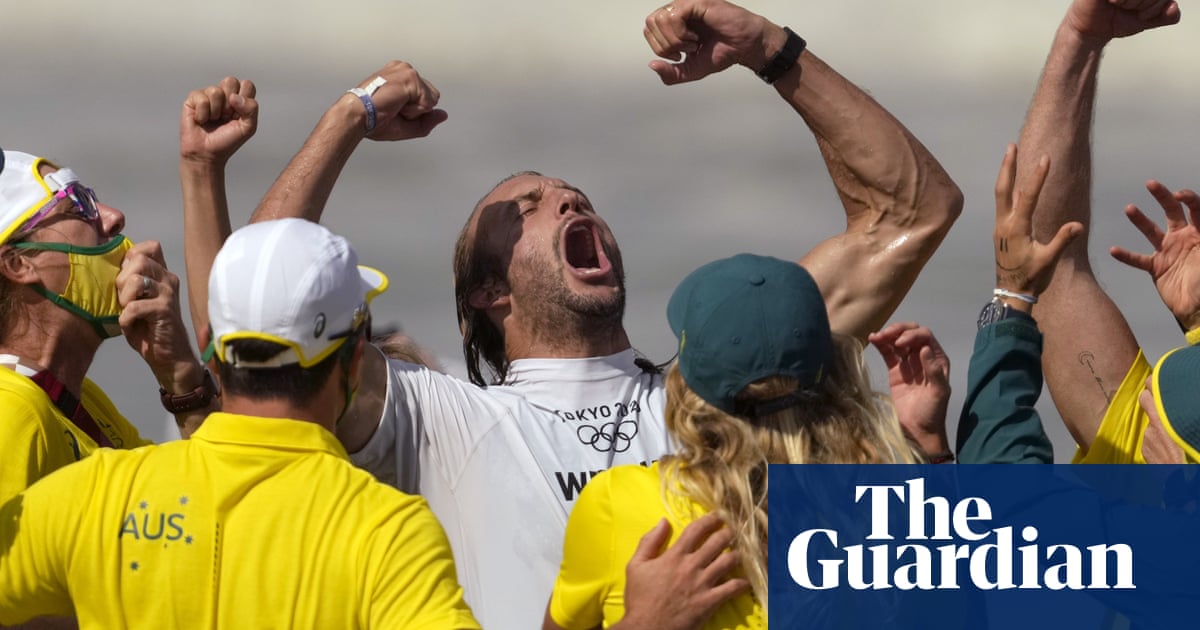
After winning the first ever Olympic medal awarded in the history of surfing, Australia’s Owen Wright said he felt like he was “walking on a cloud”.
Five and a half years ago, he couldn’t even walk.
The 31-year-old’s bronze medal, secured after defeating two-time World Surf League (WSL) champion Gabriel Medina of Brazil in stormy seas at Tsurigasaki beach, is a historic triumph. But Wright’s Olympic success is all the more remarkable given what he has had to endure.
In December 2015, the Australian surfer – born and bred on the New South Wales South Coast – was free-surfing at a notorious Hawaiian break, Pipeline, ahead of the end-of-season finale. Wright flew to Hawaii in contention to win the WSL title, after claiming victory earlier in the season at the Fiji Pro. He was in good form: in Fiji, Wright had claimed two perfect 20-point heats (surfers are scored out of 10 by a judging panel, with the best two waves counting). Only a handful of surfers have ever surfed a perfect heat, let alone two.
But suddenly, in a split second, Wright’s world – and his title hopes – came crashing down. When Wright took off at Pipeline that day on a 15ft wave, it was nothing out of the ordinary – the surfer deals with waves of consequence every day. Only that day, something went wrong. Wright came crashing down suffering a traumatic brain injury – with bleeding and a concussion.
Back home in Australia, Wright had to learn to walk – and surf – all over again. He had to sit at home while his sister, fellow pro surfer Tyler Wright, won her maiden WSL crown. It took Wright four months to return to a surf board, and over a year to get back to competitive surfing. He has described it as the worst year of his life.
“I’ve been through some bloody battles, and all my close friends and family stood beside me,” Wright said following his bronze medal win on Tuesday. “Coming from that, I had this goal to stand here with a medal around my neck and I didn’t know what colour it was gonna be and it definitely pushed me through those hard times a few years ago now.”
Owen Wright competes during the bronze medal final. Photograph: Yuki Iwamura/AFP/Getty Images
Wright returned to the WSL in 2017, after being granted a wildcard entry. Remarkably, he won his comeback event, the Quiksilver Pro, on the Gold Coast. Two years later, he had another major victory, at the Tahiti Pro in Teahupo’o, one of the heaviest waves on the WSL circuit. While Wright has not yet regained the form that saw him contend for the world title, his consistency following the injury has been impressive – Wright finished sixth overall in the WSL in both 2017 and 2018, and then ninth in 2019 (the 2020 WSL was cancelled and the 2021 circuit remains in progress).
Yet Wright has also been busy out of the waves. After his sister helped Wright through his recovery (she almost quit the WSL to care for him), the tables turned when Tyler Wright suffered post-viral syndrome – a form of chronic fatigue. The younger sibling was left bedbound and out of competition for over a year. “It had broken me, and it broke me every day,” she has said of her illness.
Owen Wright, among the older of the five siblings (all surfers), was by her side. “We had a lot of moments to share and a lot of things that she’d be like, ‘I’ve got this’ and I’d be like, ‘Yeah I’ve got that too,’” explained Wright in a 2019 interview. While Tyler Wright was not eligible for the Olympics having missed the qualification window as a result of her illness, she won the first-ever WSL event held at Pipeline at the beginning of the latest season. The win was at the same location that had sent her brother to his darkest depths.
In March 2016, when Owen Wright first returned to the water following his brain injury, he could not even stand up on a wave. “It was the [funniest] thing in the world,” he wrote on Instagram at the time. “Funny thing is … I couldn’t get to my feet. So I just [laid] there. It was about knee high and the drop was … well there was none but it felt like I was dropping into 10ft Teahupo’o. I finished the wave and I was so stoked I let out a hoot and claimed it and high fived Kita [Alexander – his partner].”
Five years later, Wright has won the inaugural medal as his sport of surfing – his love, his career, his life – made its Olympic debut. Safe to say there was plenty of hooting on Tsurigasaki beach. In Japan, Wright wasn’t just walking on a cloud. He was surfing on it, too.







